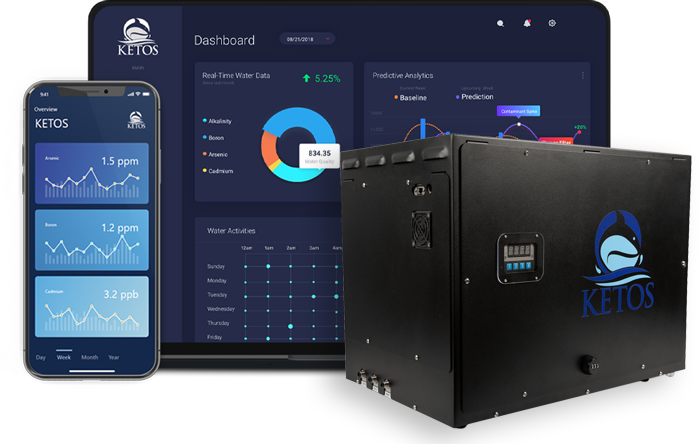Meena Sankaran, founder and CEO of KETOS, was joined by Cristina Amandpour, President and Managing Director of Isle Utilities (Americas), to discuss emerging technologies in utilities experimenting with digital water management. Watch this pre-recorded webinar video to hear their take on digital transformation trends, items blocking the adoption of digital water solutions, security concerns, and some Q&A.
Here are some main takeaways from the webinar:
Emerging Technologies Gaining Traction with Utilities
Technologies that can best address the challenges that utilities face are the ones garnering the highest amount of interest.
Key areas utilities/end users are interested in include:
- Sensors that can do better monitoring or gather better data
- Digital water management solutions that help utilities take the vast amounts of data utilities have access to and make sense of it
- Asset management, including infrastructure management using emerging technologies
How a Conservative Industry Tackles Security and Data Ownership
From a stakeholder perspective, security concerns, especially in light of recent security breach events, are top of mind. That makes utilities nervous about engaging with technology. For example, governing boards and city officials are concerned about data leaks and are still developing a technology adoption strategy. However, there’s an ever-growing consensus that utilities must embrace technologies to adapt and thrive to ever-changing consumer demand.
To address technological adoption, utilities require consideration of the pros and cons of in-house versus outsourced tools. They must also look for ways to safely adapt to a more digital landscape while being mindful of security concerns. For example, upon consideration, some organizations will currently not move to the cloud based on more significant security concerns and uncertainty. Others are more open to cloud solutions yet may be more prone to a hybrid approach to adopting digital solutions.
Watch this clip to see how IT security is influencing utilities and their decision-making here:
The Rise of Innovative Business Models
With the focus on digital technology in the water industry, many are embracing innovative business models as they consider modernizing their approach to water management. Utilities, in particular, are seeking ways to avoid high upfront costs, especially within the scope of limited budgets. Companies like KETOS, which are leveraging a DaaS and embracing $0-CAPEX business models, can help utilities enter the space and experiment with technology in ways they never thought possible.
Are Utilities Equipped for the Digital Transformation of Water?
While automation, better use of data, and visualization have much upside for utilities that crave more transparency and seek ways to lower costs, there’s a more significant issue surrounding change management that affects the water industry and every other organization working towards digital transformation.
Keep this in mind: a recent Boston Consulting Group Survey (based on 70+ industry agnostic clients attempting company-wide digital transformation) found that only 30% would realize digital transformation success based on their set objectives. Therefore, struggling to accomplish digital transformation is more than just a utility sector issue. No matter the industry, the digital shift comes with challenges that many struggle to overcome.
That doesn’t mean utilities should adopt a defeatist attitude and refuse to change. Digital transformation comes with too much upside to ignore it entirely. Instead, it’s essential to focus on specific areas to realize the benefits of going digital.
Watch this clip for a breakdown of six areas that would be imperative to transformation success:
The Importance of Flexibility and Scalability
After working with upwards of 2000 companies, Cristina emphasizes the importance of understanding the market but, more importantly, offering flexibility in services.
From offering partnerships, collaboration, open-source options, flexible contracting, and more, companies need to be agile to be successful when dealing with utilities.
Another important aspect: a company’s ability to scale. Not just scaling teams but scaling future services and partnerships. A utility or any company working with a new technology organization wants to feel confident that that company will be there 5, 10, or 20 years down the line and has a vision for future growth and adaptation.
More Insights
Watch past webinars, clips, and content related to a strategic digital transformation of water on the KETOS YouTube channel.




